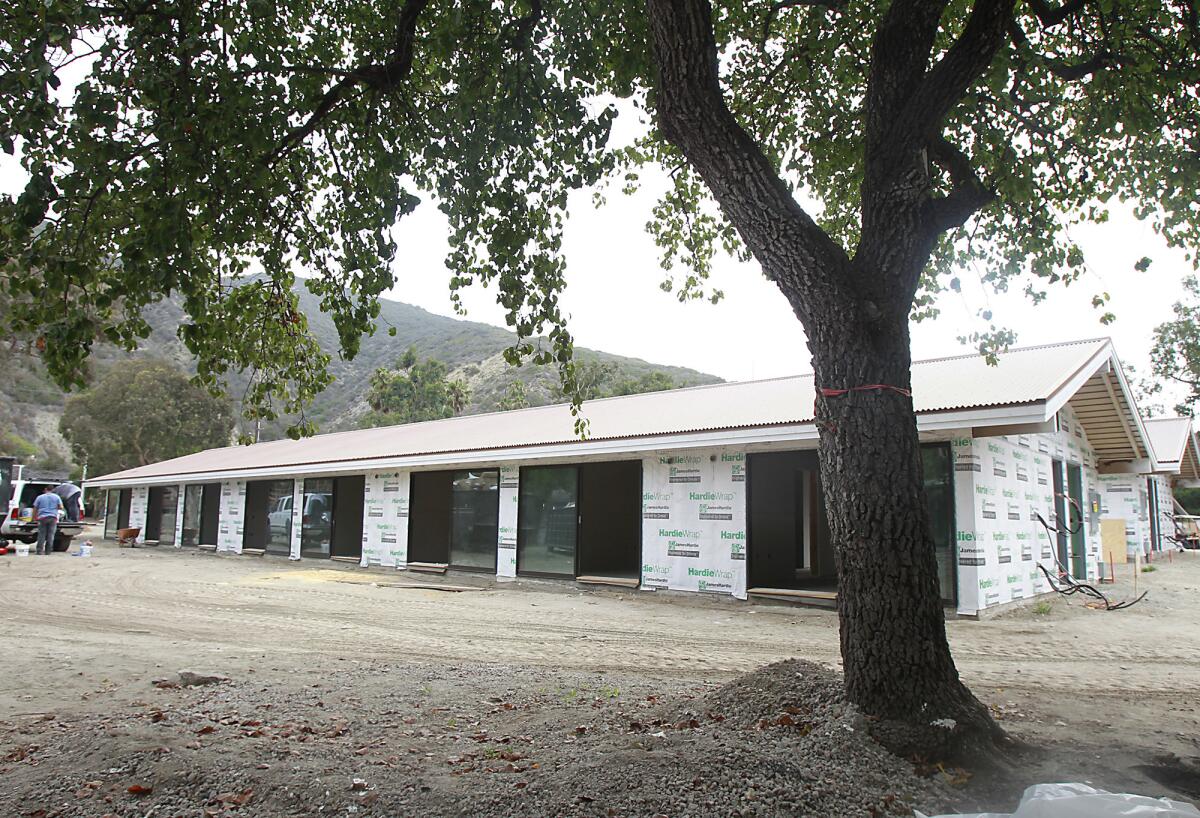Dispute over the Ranch renovation lands in court again

This single level hotel building was being remodeled and upgraded at the Ranch in Laguna Beachin 2014.
A Laguna Beach resident’s two-year battle against a hotel renovation project in Laguna Beach made its way again to court last week.
The attorney for Mark Fudge and a lawyer representing the California Coastal Commission argued their sides in Los Angeles County Superior Court on Friday.
Fudge sued the city of Laguna Beach and the commission last year, claiming, among other arguments, that the plans for The Ranch at Laguna Beach, at 31106 S. Coast Hwy., should have received greater scrutiny for possible harm to surrounding habitat.
But last November, Judge Richard Fruin dismissed the portion of the suit claiming the city had approved the work without adequate environmental review. Fruin said he dismissed the suit because Fudge did not file it in time.
Fudge challenged Fruin’s ruling and awaits an appellate court’s decision on that portion of the dispute.
On Friday, Peter Hsiao, Fudge’s attorney, claimed that his client’s due process rights were violated before and during a January 2015 hearing at which commissioners approved a coastal development permit for Laguna Beach Golf & Bungalow Village LLC’s plan for the Ranch.
Among other allegations, Hsiao told Fruin that Fudge, as the litigant, was not given a “fair and equal” opportunity to review a 67-page addition to commission staff’s original report before the Jan. 8, 2015, hearing.
That addendum contained new information regarding anticipated room rates and the effect on the overall supply of affordable accommodations in Laguna. The Coastal Commission, whose mission is to oversee protection of and access to coastal areas, said the redo of the Ranch facilities would raise rates but that they wouldn’t be the highest in the city for overnight stays.
Commission staff posted the addendum on its website the night before the hearing and emailed Laguna Beach Golf & Bungalow Village representatives, but not Fudge, according to court records.
By the time Fudge learned that the document was on the website, about 4:30 a.m. the day of the hearing, he needed to leave for the meeting, court records said.
“You have to know before walking into a hearing the basis on which the facts will be judged,” Hsiao said. “It’s not fair why the developer gets to see it and respond to it and [Fudge] had no copy of it.”
Andrew Vogel, deputy attorney general with the state’s Office of the Attorney General, claimed Fudge had time to review the document on the website before the hearing. The office represents the commission in legal matters since it is a state agency.
“The addendum was created by staff because staff took the time to respond to hundreds of pages of documents, including from Mr. Fudge,” Vogel told Fruin. “Nowhere does it say the addendum must be mailed directly to the applicant.
“[Fudge] should have known the addendum was coming.”
In response to the addendum, Laguna Beach Golf & Bungalow Village representatives requested changes to conditions that commission staff had proposed, handing their notes to commissioners during the 2015 hearing.
“No rule prohibits persons from presenting handouts to coastal commission staff, such as written notes, as long as they are shown in full and are given to staff,” Vogel said Friday.
Hsiao claimed Fudge’s due process rights were violated when he was not allowed to review or comment on those suggested changes to the project since the public comment period had closed.
“The notes were not on the table to be seen by the public,” Hsiao said. “Only the developer was given the chance to speak at the close of public comment.”
But Vogel argued: “Nowhere do regulations require [Laguna Beach Golf & Bungalow] Village to give copies to Fudge.”
It’s been more than two years since the Laguna Beach Planning Commission approved a conditional use permit for the hotel renovation, which increased the number of available rooms from 64 to 97, reconfigured a restaurant and added a spa and fitness center.
Thirty-two rooms of the hotel, once known as the Aliso Creek Inn, were split in half to create double the rental spaces.
Fudge appealed the Planning Commission’s decision to the Coastal Commission.
As part of the Coastal Commission’s approval of the project, Mark Christy, Laguna Beach Golf & Bungalow Village’s principal partner, agreed to pay $250,000 for a consultant to design a pedestrian and bicycle trail to link inland property to the coastline. Commission staff had been concerned that the project would hinder public access.
Twitter: @AldertonBryce
